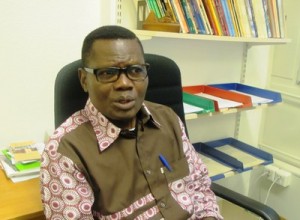
GENEVA — “HIV and AIDS is not just a public health issue. It is a multi-layered social issue – an issue churches in West Africa should not ignore,” says Rev. Godson Lawson, a pastor in the Methodist Church in Togo, a country where 110,000 people are living with HIV and 6,600 lives have been lost to the pandemic, according to recent UNAIDS estimates.
Lawson, an activist working on issues of HIV and AIDS since 1994, serves as vice-chair of the international reference group of the Ecumenical HIV and AIDS Initiative in Africa (EHAIA) of the World Council of Churches.
The churches in Togo, Lawson says, have not been fully engaged in addressing the issue of HIV which has affected the Western African region over many years. “Churches have been struggling with theologizing an appropriate stance on the use of condoms, for example, an issue deeply linked with the spread of HIV and prevention,” he says.
Now, however, Lawson observes, churches in Africa are showing more concern. “Through the EHAIA supported programmes we are promoting tools to combat the pandemic, while simultaneously offering a comprehensive and contextual response to HIV and AIDS,” he says.
Lawson explains, “In the EHAIA projects we are targeting the ‘key population’. This ‘key population’ includes people who inject drugs, sex workers, men having sex with men (MSM) and groups comprised of lesbian, gay, bisexual, and transgender (LGBT) persons. This is one segment of society that is highly vulnerable to HIV and AIDS. Surveys have shown that MSM make up about 17 to 20 percent of the people living with the virus, while sex workers and people injecting drugs make up roughly 29 percent each.
“Up till now churches have not been fully engaged in rescuing these vulnerable people,” says Lawson, who himself has lost friends and colleagues to HIV.
“What we don’t realize is that people in this category have families. Many of these people are married. And this factor eventually becomes a link in the spread of HIV to the general population. In this situation, churches must not say they cannot help people,” he said.
This is an area that EHAIA is focusing on, Lawson says. “To help vulnerable people, we have initiatives offering protection, access to care and treatment, and counseling. This is a new area for the churches, but an important one, due to the rigid cultural mindset in our societies,” he adds.











